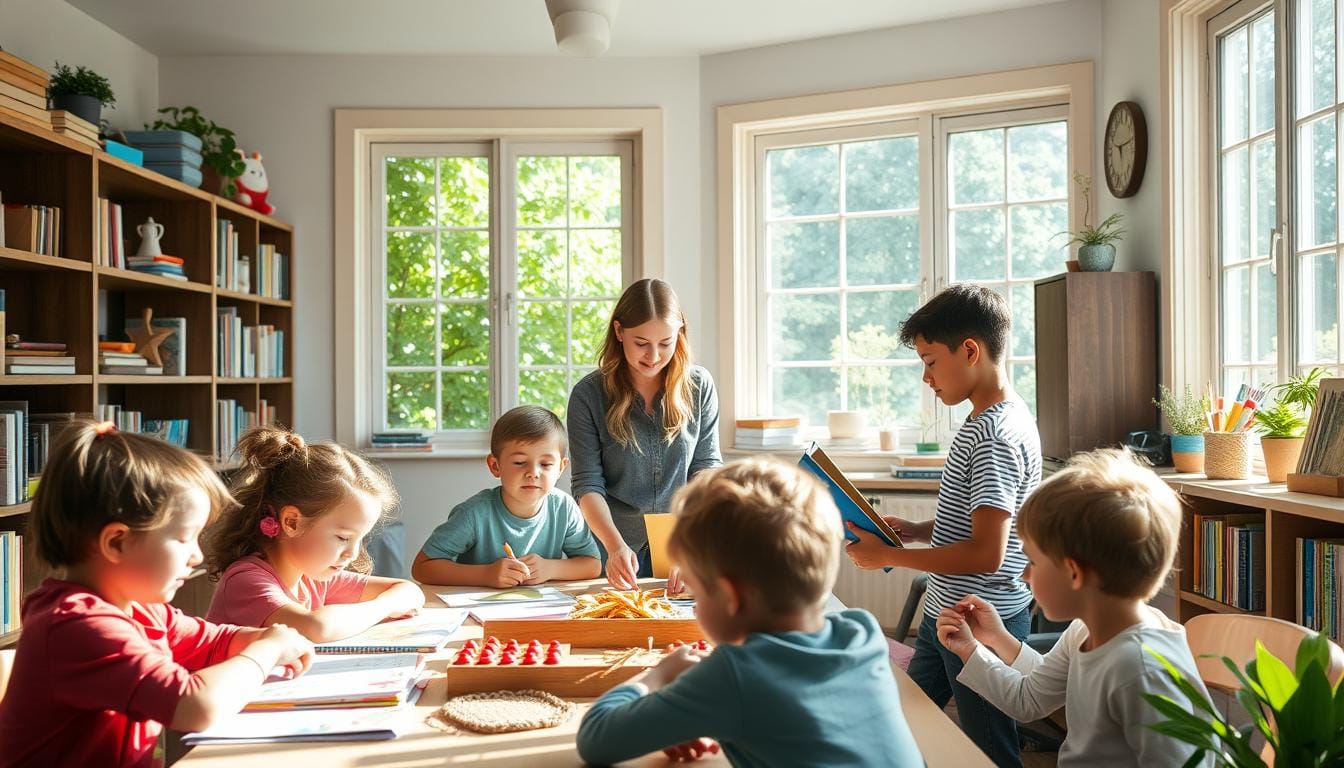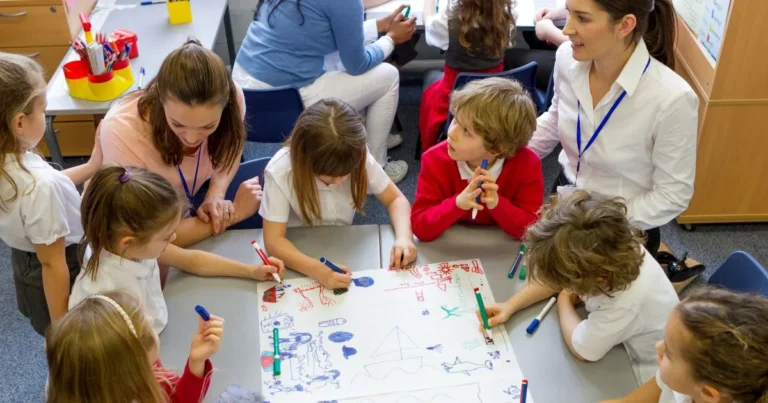Homeschooling Pros and Cons: Is It Right for You?
Every parent wants the best for their kids’ education. With traditional schools facing issues, homeschooling is becoming more popular. Families are looking for personalized and flexible learning options.
The numbers show a big change. In the 1970s, there were 15,000 homeschooled students. Now, over 2 million kids learn at home in the U.S. This growth shows a big shift in how families see education.
Homeschooling has its ups and downs. Some families do great, while others find it very challenging. Knowing the pros and cons can help you decide if homeschooling fits your family’s needs.
In this guide, we’ll dive into the homeschooling world. We’ll look at how it affects learning, social skills, money, and the law. You’ll get the info you need to decide if homeschooling is right for your kids.
Table of Contents
Understanding the Modern Homeschooling Landscape
Homeschooling has changed a lot over the years. It’s now a common choice for families. This change shows how people view learning differently today.
The rise of homeschooling is an interesting story. Here are some important numbers:
- In 1999, about 1.7% of students were homeschooled
- By 2019, this number grew to around 3.0% (2.5 million students)
- In 2020, during the COVID-19 pandemic, homeschooling jumped to 9%
- By 2024, about 6.73% of school-age kids are homeschooled
The Growing Trend of Home Education
More parents are choosing homeschooling for many reasons. Homeschooling offers benefits like more control and flexibility. It lets families tailor education to their child’s needs.
“Homeschooling allows us to customize education to our child’s unique learning style and pace.” – A Parent Advocate
What Defines Modern Homeschooling
Modern homeschooling is about creating a learning space that fits each family. Families use technology and online resources. They also join communities to give their kids a well-rounded education.
- Individualized curriculum design
- Flexible scheduling
- Diverse learning methodologies
- Enhanced parent-child educational interactions
Current Demographics
The homeschooling community is getting more diverse. While 80% of homeschool families are Christian, 20% choose it for its flexibility and personalized learning.
Your child’s educational path can be as unique as they are. Homeschooling offers a flexible and adaptable way to learn. It’s something traditional schools can’t always provide.
Why Families Choose to Homeschool
Families all over the United States are choosing homeschooling over traditional schools. This choice is personal and based on many reasons. It’s not just about learning in a classroom.
There are many reasons why families pick homeschooling. They like the chance to give their kids a personalized education. Some key reasons include:
- Creating a safe learning environment free from bullying
- Addressing individual learning needs
- Providing curriculum flexibility
- Protecting children from negative social pressures
“Homeschooling offers parents the unique opportunity to craft an education truly tailored to their child’s potential.” – National Home Education Research Institute
Statistics show that about 3.7 million students were homeschooled in the 2020-2021 school year. A big reason is that 90% of parents want a better education for their kids. Homeschooling lets parents:
- Customize learning paths
- Adapt teaching methods
- Focus on individual strengths
- Address specific educational challenges
Also, about 61% of homeschooling families are worried about traditional schools. The chance to make a learning space more supportive and tailored is a big reason for many parents.
The Freedom of Customized Learning Environments
Homeschooling lets you create a learning space that fits your child perfectly. It’s not like traditional schools. You can make education match your child’s needs, interests, and how they learn best.
Flexible Scheduling Options
One big plus of homeschooling is setting your schedule. This means you can:
- Change lesson times to when your child learns best
- Include travel and real-life experiences in learning
- Find a balance between school and other activities
- Work around family needs and schedules
Curriculum Choice and Adaptation
You don’t have to stick to one curriculum in homeschooling. Parents can:
- Pick learning materials that match family values
- Combine different curriculum sources
- Change learning materials to fit individual needs
- Try out different educational methods
“Education is not the filling of a pail, but the lighting of a fire.” – William Butler Yeats
Learning Style Accommodation
Every child learns in their way. Homeschooling lets you support your child’s learning style, whether it’s visual, auditory, kinesthetic, or a mix.
By choosing personalized learning, you create a space that encourages your child’s curiosity and growth.
Academic Benefits and Educational Control

Homeschooling brings unique benefits that change how we learn. It lets parents control their child’s education. This means learning can be tailored to fit each child’s needs.
Studies show the benefits of homeschooling:
- Homeschooled students score 15-25 percentile points higher on tests
- About 90% get into their top college choice
- One-on-one learning helps students understand and learn faster
“Personalized education empowers students to reach their full potential beyond traditional classroom constraints.” – Education Research Institute
Your child can gain a lot from homeschooling. Homeschooling’s flexibility lets you:
- Make the curriculum fit your child’s learning style
- Focus on what they’re good at and interested in
- Give extra help in tough subjects
Homeschooling goes beyond regular school, offering a flexible way to learn. It focuses on each student’s growth and success.
Homeschooling Pros and Cons: A Comprehensive Analysis
Exploring homeschooling means understanding its many sides. With about 3.7 million students homeschooled in the U.S., more families are looking into it. Let’s examine the good and bad of homeschooling to help you decide.
Primary Advantages to Consider
Homeschooling brings benefits that regular schools can’t match. Studies from the National Home Education Research Institute show several key benefits:
- Learning plans made just for you
- Flexible schedules and choices in what you learn
- Getting help one-on-one and learning at your own pace
- Often, better grades
“Homeschooling allows parents to create an educational experience that truly matches their child’s learning style and interests.”
Notable Challenges to Address
Homeschooling offers many chances, but it also has big challenges for families:
- Parents need to spend a lot of time on homeschooling
- It can be hard to stay connected with friends
- It costs money to get the right materials
- Staying motivated on your own can be tough
Impact on Family Dynamics
Homeschooling changes family life a lot. The intense learning environment can strengthen bonds but also add stress. Families should get ready for more time together and learn as a team. This can either bring families closer or put a strain on them.
Knowing the pros and cons of homeschooling helps you decide if it’s right for your family. It’s about matching your family’s goals and what you can handle.
Social Development and Community Integration

Many families worry about their kids’ social skills when they homeschool. They fear their children won’t learn how to interact with others outside of school. But, there are many ways for homeschoolers to meet new people and join different communities.
There are smart ways to tackle social development challenges in homeschooling:
- Joining local homeschool co-ops
- Playing on community sports teams
- Helping out through volunteer work
- Going to group learning sessions
- Connecting with youth groups
These activities help kids make friends and learn important social skills. Homeschooled students often meet people of all ages and backgrounds. This can make them more flexible and better at talking to others.
“Social development is not about quantity of interactions, but quality of meaningful connections.” – Education Research Institute
To deal with social worries, families can plan social events. Online groups, community classes, and sports teams are great for meeting others. They help kids feel more connected and overcome homeschooling’s social hurdles.
Financial Implications and Resource Requirements
Homeschooling is a big financial and time commitment. It’s different from traditional school. Knowing what you need can help you decide if homeschooling is right for your family.
Cost Considerations
Starting homeschooling means you need to plan your money carefully. Families usually spend $400 to $1,500 a year on books and online learning tools. It’s a challenge to keep costs down while still providing a good education.
- Curriculum materials and textbooks
- Educational software and online resources
- Extracurricular activity expenses
- Potential income reduction if a parent reduces work hours
Time Investment
Homeschooling requires a lot of time. Parents spend about 40 hours a week teaching, planning, and helping with homework. It’s like having a full-time job and takes a lot of personal effort.
“Homeschooling is not just an educational choice, but a lifestyle commitment that demands time, patience, and resources.”
Required Materials and Support
Good homeschooling needs the right materials and support. Many families use:
- Online educational platforms
- Local homeschooling co-ops
- Community learning groups
- Supplemental tutoring services
With good planning and the right resources, you can overcome homeschooling’s financial and time hurdles.
Parental Responsibilities and Qualifications
Homeschooling turns parents into teachers, needing a deep understanding of both parenting and teaching. You must prepare well, commit fully, and plan carefully to face the unique challenges of home education.
When thinking about homeschooling, parents must check if they are ready. Successful homeschooling depends on several key things:
- Strong subject knowledge across multiple disciplines
- Patient and adaptable teaching approach
- Excellent organizational skills
- Willingness to continuously learn and improve
Being a homeschool parent means more than just teaching. You’ll have to create lessons, track progress, and make learning fun. This takes a lot of time and emotional effort.
“Homeschooling is not just an educational choice, but a lifestyle commitment that reshapes family dynamics.” – National Home Education Research Institute
To help with homeschooling, try these professional development tips:
- Join local homeschool support groups
- Attend educational workshops
- Leverage online learning resources
- Network with experienced homeschool parents
Remember, while homeschooling has its challenges, many families find it very rewarding. It strengthens family bonds and offers personalized learning experiences.
Legal Requirements and Academic Standards
Understanding the laws of homeschooling is crucial. Each state has its own rules for home-based learning. Parents must know these to give their kids a good education.
When thinking about homeschooling, you’ll face several legal issues:
- Registration requirements in your specific state
- Curriculum documentation and record-keeping
- Assessment and progress tracking methods
- State-mandated subject coverage
“Knowledge of local homeschooling regulations is crucial for successful alternative education,” says education expert Dr. Patricia Johnson.
About 3.7 million students are homeschooled in the U.S. This is about 6.73% of all school-age kids. Different states have dramatically different approaches to homeschooling oversight. Some need little paperwork, while others want detailed reports.
Parents should think about a few important things:
- Verify your state’s specific homeschooling laws
- Maintain detailed academic records
- Ensure comprehensive subject coverage
- Plan for future educational transitions
Studies show homeschooled kids often do as well as or better than public school students. They score a median of 85% on standardized tests. This shows homeschooling can be just as good as traditional schools.
Conclusion
Homeschooling has changed a lot in recent years. About 3.7 million students learned at home in the 2020-2021 school year. Families need to know the good and bad of homeschooling before deciding.
Think carefully about your family’s needs before choosing homeschooling. Studies show that 90% of homeschooling parents are happy with their choice. Their kids often do better in school too.
Learning at home lets kids move at their speed. They might even do 15-30 points better on tests than kids in regular schools.
But homeschooling isn’t without its challenges. You’ll need to spend time and effort on creating a good learning space. It’s also important to teach well, manage family life, and make sure your child meets other kids.
About 70% of homeschooled kids join outside classes. This helps with socializing concerns.
Homeschooling is a big decision that needs dedication and creativity. By understanding both sides and being open to change, you can give your child a great education that fits their needs.








